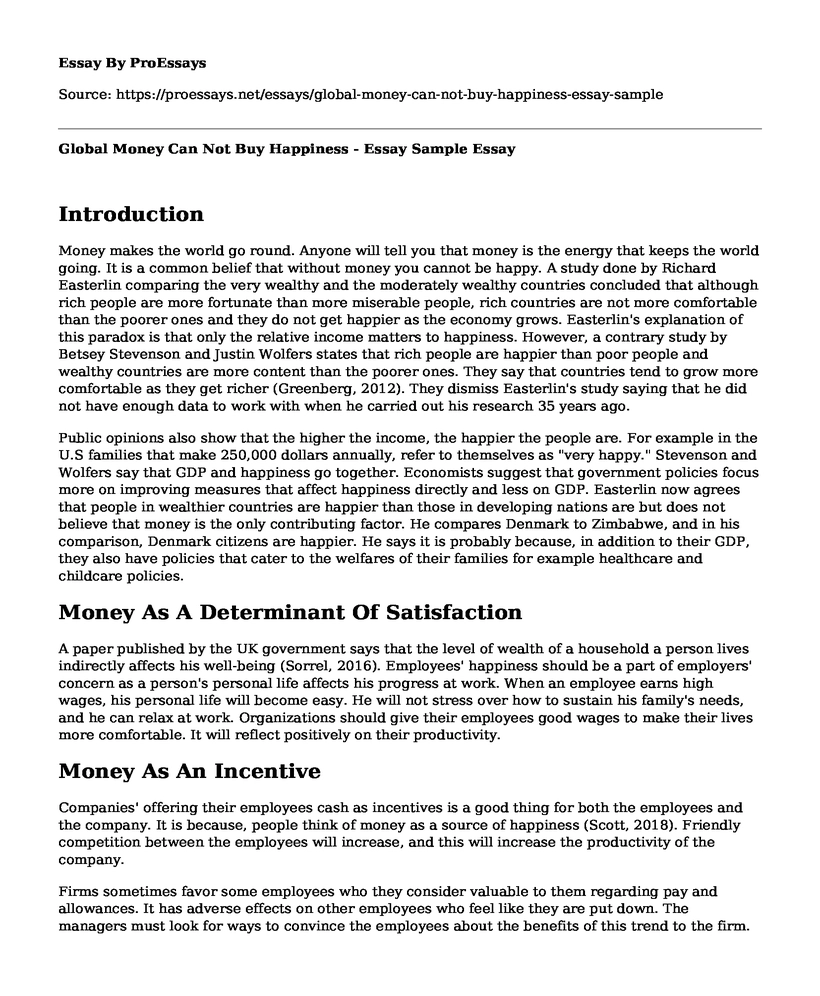Introduction
Money makes the world go round. Anyone will tell you that money is the energy that keeps the world going. It is a common belief that without money you cannot be happy. A study done by Richard Easterlin comparing the very wealthy and the moderately wealthy countries concluded that although rich people are more fortunate than more miserable people, rich countries are not more comfortable than the poorer ones and they do not get happier as the economy grows. Easterlin's explanation of this paradox is that only the relative income matters to happiness. However, a contrary study by Betsey Stevenson and Justin Wolfers states that rich people are happier than poor people and wealthy countries are more content than the poorer ones. They say that countries tend to grow more comfortable as they get richer (Greenberg, 2012). They dismiss Easterlin's study saying that he did not have enough data to work with when he carried out his research 35 years ago.
Public opinions also show that the higher the income, the happier the people are. For example in the U.S families that make 250,000 dollars annually, refer to themselves as "very happy." Stevenson and Wolfers say that GDP and happiness go together. Economists suggest that government policies focus more on improving measures that affect happiness directly and less on GDP. Easterlin now agrees that people in wealthier countries are happier than those in developing nations are but does not believe that money is the only contributing factor. He compares Denmark to Zimbabwe, and in his comparison, Denmark citizens are happier. He says it is probably because, in addition to their GDP, they also have policies that cater to the welfares of their families for example healthcare and childcare policies.
Money As A Determinant Of Satisfaction
A paper published by the UK government says that the level of wealth of a household a person lives indirectly affects his well-being (Sorrel, 2016). Employees' happiness should be a part of employers' concern as a person's personal life affects his progress at work. When an employee earns high wages, his personal life will become easy. He will not stress over how to sustain his family's needs, and he can relax at work. Organizations should give their employees good wages to make their lives more comfortable. It will reflect positively on their productivity.
Money As An Incentive
Companies' offering their employees cash as incentives is a good thing for both the employees and the company. It is because, people think of money as a source of happiness (Scott, 2018). Friendly competition between the employees will increase, and this will increase the productivity of the company.
Firms sometimes favor some employees who they consider valuable to them regarding pay and allowances. It has adverse effects on other employees who feel like they are put down. The managers must look for ways to convince the employees about the benefits of this trend to the firm.
We learn that although money cannot buy us happiness, it makes us happy. The wealthy are more content than the poor are. A person who has money to buy whatever he wants whenever he wants will be satisfied while someone who has to worry about how to budget for the little money he has cannot be happy.
References
Greenberg, M. (2012, September 10). Psychology today. Retrieved from Is Money the Secret to Happiness?: https://www.psychologytoday.com/us/blog/the-mindful-self-express/201209/is-money-the-secret-happiness
Scott, S. (2018, June 30). Chron. Retrieved from Rewards and Incentives in the Workplace: https://smallbusiness.chron.com/rewards-incentives-workplace-11236.html
Sorrel, C. (2016, January 20). FastCompany. Retrieved from Money Will Make You Happy Because Life Without Money Is Hard: https://www.fastcompany.com/3055612/money-will-make-you-happy-because-life-without-money-is-really-hard
Cite this page
Global Money Can Not Buy Happiness - Essay Sample. (2022, Jun 30). Retrieved from https://proessays.net/essays/global-money-can-not-buy-happiness-essay-sample
If you are the original author of this essay and no longer wish to have it published on the ProEssays website, please click below to request its removal:
- The Central Beliefs, Customs, Traditions Practices and Contributors of Buddhism
- Major Causes of Bank's Liquidity Risk in Saudi Arabia Essay Example
- Identification of Pupil Mental Health Issues Paper Example
- The Components of the Structure of Personality Essay
- Birth Order Impacts Personality: Research Findings
- Paper Example on My Nature Escapades: Exploring Waterfalls for Stress Relief
- Funding Sports/Festivals: Economic Impact and Misapplication - Research Paper







